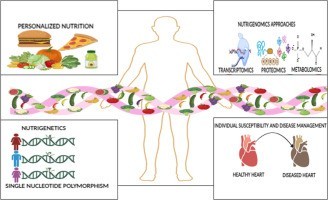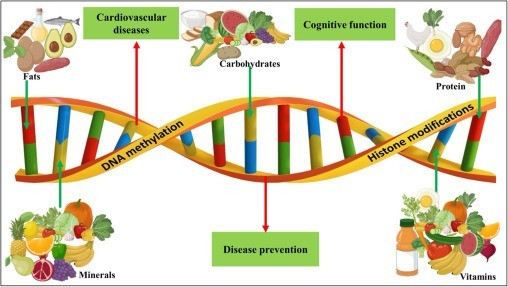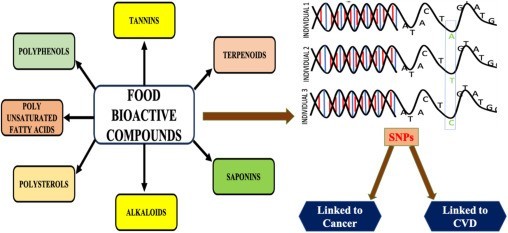Article on Personalised Nutrition: The Role of Genomics in Diet Planning
M3 India Newsdesk Jun 30, 2025
This article explains how personalised nutrition, guided by an individual’s genetic makeup, can optimise health by tailoring dietary plans to specific genetic traits. It highlights the science, benefits, practical applications, & ethical considerations of using genomics in diet planning.

Personalised nutrition, or nutrigenomics, uses an individual's genetic makeup to tailor dietary recommendations for optimal health and well-being. By analysing an individual's genetic variations, specifically in genes related to nutrient metabolism, personalised nutrition plans can be developed to optimise nutrient absorption, utilisation, and overall health outcomes.

Here's a more detailed look at the role of genomics in diet planning:
1. Understanding Genetic Variations
Nutrigenomics
explores the interaction between genes and nutrients, examining how genetic variations influence an individual's response to different dietary components.
Single Nucleotide Polymorphisms (SNPs)
There are common genetic variations that can affect how individuals process nutrients, leading to personalised dietary needs.
Genetic Testing
can reveal variations in genes involved in nutrient metabolism, such as carbohydrate, fat, and protein metabolism, as well as variations in genes related to food sensitivities and intolerances.
2. Tailoring Dietary Recommendations
Personalised Nutrition Plans
can be developed based on an individual's genetic profile, taking into account their unique needs and responses to various nutrients.
Dietary Interventions
can be tailored to support a healthy gut microbiome, address specific gastrointestinal issues, and optimise overall health.
Examples of personalised nutrition
may include dietary recommendations for managing type 2 diabetes, heart disease, or cancer, based on an individual's genetic predisposition and response to specific nutrients.
3. Benefits of Personalised Nutrition
Improved Health Outcomes
Tailoring dietary recommendations to an individual's genetic makeup can lead to better health outcomes and reduced risk of chronic diseases.
Enhanced well-being
Personalised nutrition can help individuals achieve and maintain a healthy body weight, optimise their nutritional intake, and manage chronic illnesses effectively.
Optimised sports performance
For athletes, personalised nutrition can help them maximise their performance and recovery by tailoring dietary strategies to their genetic makeup.
4. Considerations and Future Directions
Cost and Complexity
Whole genome sequencing for personalised nutrition is currently expensive and complex, but advancements in technology may make it more accessible in the future.
Data Interpretation
Accurately interpreting genetic data and translating it into practical dietary recommendations requires expertise and ongoing research.
Integration of Other Factors
Personalised nutrition plans should also consider other factors such as age, gender, lifestyle, and pre-existing health conditions.
Future Research
Ongoing research in nutrigenomics is exploring the role of genetic variations in various aspects of nutrition, including gut microbiome composition, nutrient absorption, and disease prevention.

What Is Personalised Nutrition Based on Genomics?
Personalised nutrition is a customised approach to diet planning, driven by your unique genetic blueprint. Instead of cookie-cutter diets, it tailors food choices based on how your body is wired to metabolise, absorb, and respond to nutrients.
Genomics comes into play by decoding your DNA, identifying SNPs (single-nucleotide polymorphisms), or tiny changes in genes that influence:
- Nutrient metabolism (e.g., MTHFR gene affecting folate metabolism)
- Lactose tolerance (like LCT gene variants)
- Caffeine sensitivity (CYP1A2 gene)
- Risk for obesity, type 2 diabetes, and heart disease
- Response to fats, carbs, exercise, and even stress
Key Genetic Markers with Nutritional Impact
|
Gene |
What it Influences |
Dietary Insight |
|
MTHFR |
Folate, B12 metabolism |
Need more methylated folate/B12 |
|
FTO |
Fat mass & obesity risk |
Sensitive to high-fat diets |
|
TCF7L2 |
Type 2 diabetes risk |
Carb moderation needed |
|
APOE |
Cholesterol transport |
Saturated fat increases LDL more |
|
CYP1A2 |
Caffeine metabolism |
Slow metabolisers = higher heart risk with caffeine |
|
LCT |
Lactose digestion |
Intolerant? Go dairy-free or fermented only. |
|
SLC23A1 |
Vitamin C absorption |
May need more dietary Vitamin C |
Why It’s a Game-Changer for Diet Planning
- Precision: Moves away from one-size-fits-all plans to custom strategies.
- Prevention: Helps identify and mitigate chronic disease risks early.
- Motivation: People tend to comply better when they see their DNA “asking” them to.
- Functional Approach: Aligns beautifully with clinical and functional nutrition, especially in chronic, autoimmune, or metabolic conditions.
Practical Application
Let’s say someone has:
- FTO variant: You'd recommend a diet lower in saturated fats and refined carbs, possibly Mediterranean-style.
- MTHFR mutation: Prioritise methylated folate, B12, and avoid folic acid-fortified foods.
- CYP1A2 slow metaboliser: Limit caffeine, especially in anxiety-prone or hypertensive clients.
- Lactase non-persistence (LCT): Recommend fermented dairy like curd or plant-based alternatives.
How It Looks on a Plate
|
Trait |
Personalised Recommendation |
|
Low Vitamin D gene expression |
Emphasise sunlight exposure, supplementation |
|
High sodium sensitivity |
DASH-style low-sodium plan |
|
Oxidative stress risk |
Rich in polyphenols, crucifers, berries, and omega-3s |
|
Detox gene sluggish (e.g., GSTT1) |
Cruciferous veggies, Sulphur-rich foods, and avoid alcohol |
Limitations and Ethical Considerations
- Genomics gives tendencies, not certainties
- Epigenetics, gut microbiome, and lifestyle still matter big time
- Cost and access can be a barrier
- Ethical concerns: data privacy, misuse by insurers or employers
Closing Thought
Personalised genomics-based nutrition is not about hacking your health, it's about honouring your biological heritage. It's ancient wisdom wrapped in futuristic science — food as medicine, yes — but now prescribed by your double helix.
If Hippocrates were alive today, he'd probably say:
“Let thy DNA guide the food, and the food guide thy destiny.”

Mock Genetic Profile Summary
A 38-year-old man has a sedentary tech job, occasional walking is a health goal are to weight loss, insulin sensitivity, and mental focus
Genetic Traits:
|
Gene |
Variant |
Implication |
|
FTO |
Risk allele |
Higher fat storage, carb sensitivity |
|
MTHFR C677T |
Homozygous mutation |
Poor folate & B12 methylation |
|
CYP1A2 |
Slow metabolizer |
Sensitive to caffeine |
|
APOE ε4 |
Present |
Higher LDL with saturated fat |
|
LCT |
Non-persistent |
Likely lactose intolerant |
|
GSTT1 |
Null variant |
Low detox capacity |
Personalised Nutrition Plan for Aryan
Pattern:
- 16:8 Intermittent Fasting (Eating window 11 am–7 pm)
- Low Glycemic, Anti-inflammatory, Moderate-fat diet
11:00 AM – Breakfast Meal (Post Fast)
Main
- Methi Thepla (gluten-free with jowar + flaxseeds)
- Avocado chutney (for good fats + methylation support)
Add-ons
- Ashwagandha tea (caffeine-free adaptogen)
- Activated B-complex supplement (methylated folate + B12)
Why? Low glycemic, dairy-free, rich in polyphenols, supports MTHFR.
2:00 PM – Main Meal
Option 1
- Quinoa + Moong Dal Khichdi
- Stir-fried broccoli, red cabbage, turmeric, garlic (GSTT1 support)
- Amla pickle (natural Vitamin C boost)
Option 2
- Millets (Kodo or Foxtail) with sambar (lots of vegetables, no tamarind)
- Beetroot and sesame salad
Why? Fibre-rich, anti-inflammatory, supports detox, low saturated fat for APOE ε4.
6:30–7:00 PM – Light Dinner
Option 1
- Vegetable soup with tofu or soaked walnuts
- Moringa leaves stir-fry
- 1 soft-boiled egg (if tolerable with APOE ε4)
Option 2
- Sautéed methi and sprouts stir fry
- Moong dosa or besan chilla
Why? Light on digestion, rich in protein & methyl donors, no lactose, low-fat.
Snacks (optional, during eating window)
- Pumpkin seeds + sunflower seeds trail mix
- Coconut water with chia (if not allergic)
- Apple slices with almond butter (small portion)
Supplements (Based on Gene-Support Needs)
|
Need |
Supplement |
|
MTHFR |
Methylated folate + B12 |
|
APOE |
Omega-3 (EPA+DHA), no saturated fat |
|
Detox |
NAC or milk thistle extract |
|
Vitamin D |
D3 with K2, 2000 IU |
|
Gut health |
Probiotic (Lactobacillus + Bifido strains) |
Lifestyle Add-ons
- Exercise: Fasted walking + strength training thrice a week
- Sleep hygiene: Blue-light blockers post 8 pm, magnesium-rich foods at dinner
- Stress: Box breathing, journaling, adaptogens like Tulsi or ashwagandha
Final Word
This isn’t some influencer trend or biohacking fantasy — this is the next chapter in clinical dietetics. Genomics-based diets are old wisdom made personal again, backed by hard science.

Disclaimer: The views and opinions expressed in this article are those of the author and do not necessarily reflect the official policy or position of M3 India.
About the author of this article: Pallavi Dubey has done a Master's in Clinical Nutrition & Dietetics and is currently working as a Senior Clinical Nutritionist at Recoup Health, Bangalore.
-
Exclusive Write-ups & Webinars by KOLs
-
Daily Quiz by specialty
-
Paid Market Research Surveys
-
Case discussions, News & Journals' summaries